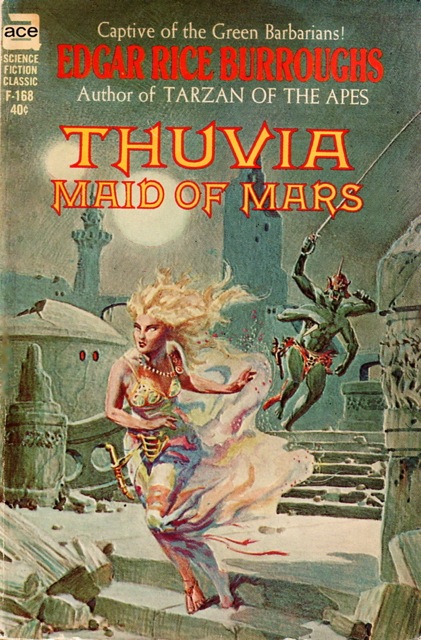The Hunger for the Heroic
November 8, 2011

From Burroughs' Barsoom series, which also included A Princess of Mars
THOMAS F. BERTONNEAU writes:
This week the text in my course on “Science Fiction in Literature and Film” is Edgar Rice Burroughs’ first-published work, A Princess of Mars (1912 – original title, Under the Moons of Mars). The protagonist is John Carter, formerly of the Army of Virginia under General Lee, who, succumbing to a paralyzing gas in an Arizona Cave circa 1870, wakes up on Mars and begins his rise through the strata of Martian society. He finds a helpmate in the beautiful and resourceful Dejah Thoris, Princess of the Twin Cities of Helium. It is essentially a chivalric romance on another planet. Predictably, the women in the class speak out positively in praise of the novel, which they like a good deal more than they liked The World Set Free and The Food of the Gods by H. G. Wells or Last and First Men by W. Olaf Stapledon. They do not consciously realise how opposite to the feminist values that they have learned elsewhere A Princess of Mars is, but they intuit it. The men like Burroughs too. A couple of years ago I wrote an article (it appeared at The Brussels Journal) on “Edgar Rice Burroughs and Masculine Narrative.”
I believe that college students are starved for moral narrative, of the kind once offered by Howard Pyle. There is nothing PC in Burroughs, but the characters male and female are independent, decent, loyal, resourceful, stalwart, and courageous.
One of the things I was intent to comment on in the Brussels Journal essay was the way in which contemporary preface-contributors to new editions of Burroughs feel compelled to excuse him for his putative “racism” and “sexism.” Thus I wrote –
The problem, for Burroughs’ nervous critics, is not, as honest examination of Burroughs’ text will demonstrate, that Burroughs retails in demeaning representations of women, exaggeratedly malerepresentations of men, or – God help us – in mean-spirited portrayals of despised Philippine guerrilla-rebels under the imagery of evil winged reptiles. He perpetrates none of this. The problem is that Burroughs makes a compelling case for pre-politically correct images of the masculine and the feminine – especially the feminine – that have deep roots in the Western tradition, as Beowulf or La morte d’Arthur teaches us. The preface-writers, being despite themselves aficionados of that modern version of medieval epic, the planetary romance, know this instinctively, but because they all have contracts with a university press, they act reflexively to suppress the intuition. The PC preface-writers are afraidof Dian the Beautiful and Oo-aa, who has “seven brothers” or “eleven brothers” or perhaps “thirteen,” all ready to defend her reputation.
Modern, politicized, conformist codes, and “organization” thinking, drastically limit individuation and autonomous judgment. That Burroughs wrote muscular prose, not without art, goes some way in explaining his persistence as a “good read” sixty years after his death and nearly a century after his first publication. In addition to telling a ripping yarn, however, Burroughs possessed moral perspective, which grew more acute, as the decades of the Twentieth century ticked away and modernity increasingly revealed its ugly tendencies. Burroughs witnessed the attack on Pearl Harbor and became a war correspondent in the Pacific Theater. At the very end of his life he began a new interplanetary series in which the recurrent anti-war theme of his previous work came to the fore.
— Comments —
Roger G. writes:
I was introduced to the John Carter and Tarzan books – as well as to Robert E. Howard’s Conan the Barbarian – by Marine Corps four star general John R. Allen, when he was 14 and I was 13. I also spent my falls blocking for him, and my springs playing first base with him either in right field or catching.
Besides having the intelligent and adventurous boy’s love of heroic literature, as an adolescent he was already amazingly well read in more serious subjects. I wouldn’t tell even if I did have sordid secrets to reveal, but I swear by heaven there are none. He was just a damn fine boy, and has obviously become quite a man (I haven’t spoken to him in forty years).
I will say that whatever the Marine Corps policy is on homosexuals, he liked girls. I mean he really liked them a whole lot.
But I was a better hitter (though I’ll bet the *!@## won’t admit it!).
